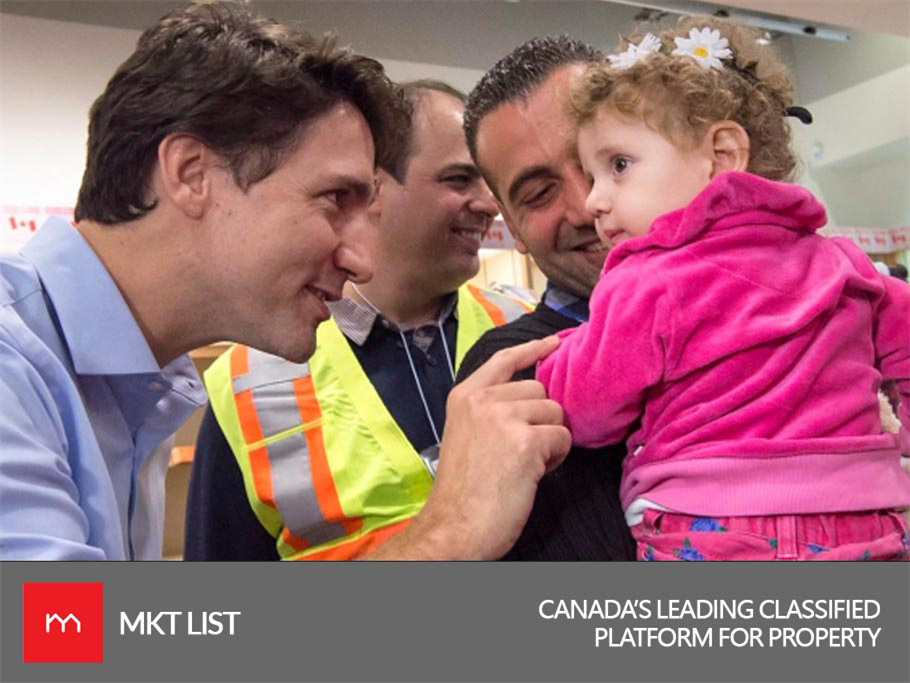

The Syrian Refugees, Hussam Alahmad and his wife Sherin, after surviving the brutal war happening in Syria came to seek refuge in Canada, hoping that their bad days would all past soon. After their arrival, the family welcomed their second child, a baby boy, on the Canadian ground.
The couple named him "Justin," in honor of Prime Minister Justin Trudeau. It was a sign how grateful they are to their adopted country, an optimistic Alahmad said last February.
In honor of the services and gracious hospitality by the PM, they named this child Justin to pay the gesture of gratitude to this country, Alahmad, an optimistic man said last February.
After just a momentous one year, the family’s faith is shaking.
Since CBC Toronto last met the family, the four refugees settled in a one-bedroom apartment in Mississauga from North York hotel room, recommended by a non-profit caseworker. The family is all and all depend on government’s assets to carry on their living, be it food or clothing. They are provided with $1400 per month unit.
Before this donation, Alahmad, Sherin and their three-year-old daughter Izdihar used to sleep on bedroom’s floor, now they can sleep on a single air mattress.
The family feels an emotion of loneliness.
The family has done all this on their own. They didn’t get any governmental or private sponsorship, rather they presented as refugee applicants. After living abroad for some time, they stepped on Canada through the U.S. and they got only $300 to spend. Even today, the family hasn’t got any support system as they don’t know the English language, hasn’t made any friends, and no employment.
The government says that these Syrian refugee cases are rare. Many people don’t bear the situation and dig down with a bang. On the contrary, many services and support are given to thousands of sponsored Syrian refugees.
Alahmad said in his not-so-good English "I'm lost. I'm lost now."
Alahmad, a man sitting in his living room wearing a dark jacket, tie, and pants — a dress that is with him for over four months, sadly encountered that he hasn’t got any job in the field of automotive even with his 14 years of experience in car dealings in Syria.
He said without Canadian experience, no Canadian employers would hire him.
Alahmad said, "That makes me so, so depressed, and so frustrated. If I don't find this opportunity, how can I [gain] Canadian experience?"
To run his living, he is working at a local food bank near the place he is currently living in Mississauga. But that makes him sad as he wants to work because without it the purpose of living seems useless. For his mental health, for his loved ones, and for his ill mother in Turkey, he wants to do a job, he really wants to make the most of him.
Sherin suspected when she said in Arabic that Canada’s life is difficult. Her husband said that she has been waiting for a good place to learn English.
Alahmad said, "I can't find my future by myself here. We have a lot of obstacles."
From November 2015, exceeding 40,000 Syrian Refugees have arrived in Canada, all who are government or privately sponsored.
Many fewer numbers of people like Alahmad and his family came to seek shelter as refugee claimants.
CBC News showed a data revealing that from January 2013 and September 2017, the Immigration and Refugee Board looked roughly upon 3,300 Syrian cases which many of them gained a good response.
This data means that thousands of Syrians came to Canada having to backbone or support system in the face of sponsorship in the recent years.
Refugee and immigration experts say when almost all the Syrian Refugees are earning their bread on their own and now know English, it would be very tough for the ones who haven’t got any support network like government and private sponsorship. Many such people are now suffering from mental health problems as they feel living in Canada is challenging, not knowing an entirely different living.
"Everything gets turned upside down," said Mario Calla, executive director of Toronto-based COSTI Immigration Services.
Anne Woolger, founding director of Matthew House Toronto knew when she said that many refugees who are even very qualified found difficulty to pursue their career.
This is all because they don’t fulfill the requirements needed for Canadian career as they worked in entirely different designations, training, spoke different languages in the past. Added that many are without sponsorship. So, directing the paths of Canadian services and career opportunities are needed, as per suspected by Woolger.
Calla and Woolger both believed that such refugee success stories are now becoming a usual topic.
COSTI supports and works with many people. Similarly, it has worked with many Syrian refugees who were brilliant and creative and were successful enough to launch their own businesses. Calla said that one family started working as a caterer and owned a catering company, after some time the father was able to work in a restaurant and now they run their own restaurant successfully in Oakville.
He said, "You don't hit the ground running when you arrive. "It takes a while, and things start to fall into place."
Woolger said that the vital cause in all this is, difficulty to show the refugees opened Canadian doors for them whether it is for inviting them to dinner or calling for their first job.
Still, Alahmad is hopeful that one day he will be able to get back what has been lost, his everything. He will one day get an opportunity to provide his family on his own.
He said with a full heart, "I love Canada, from my heart. I would like to do everything for Canada. But I haven't found the opportunity to start."
Let’s stand with Alahmad and others!
Want to know more? Keep visiting MKTLIST.
Be the first to Comment